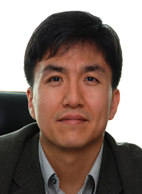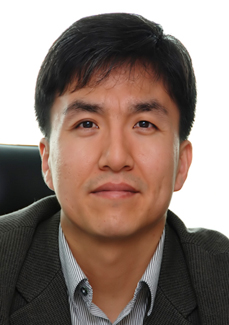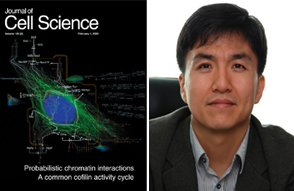Systems+Biology
-
 Systems biology demystifies the resistance mechanism of targeted cancer medication
Korean researchers have found the fundamental resistance mechanism of the MEK inhibitor, a recently highlighted chemotherapy method, laying the foundation for future research on overcoming cancer drug resistance and improving cancer survival rates. This research is meaningful because it was conducted through systems biology, a fusion of IT and biotechnology.
The research was conducted by Professor Gwang hyun Cho’s team from the Department of Biology at KAIST and was supported by the Ministry of Education, Science and Technology and the National Research Foundation of Korea.
The research was published as the cover paper for the June edition of the Journal of Molecular Cell Biology (Title: The cross regulation between ERK and PI3K signaling pathways determines the tumoricidal efficacy of MEK inhibitor).
Targeted anticancer medication targets certain molecules in the signaling pathway of the tumor cell and not only has fewer side effects than pre-existing anticancer medication, but also has high clinical efficacy. The technology also allows the creation of personalized medication and has been widely praised by scientists worldwide.
However, resistances to the targeted medication have often been found before or during the clinical stage, eventually causing the medications to fail to reach the drug development stage. Moreover, even if the drug is effective, the survival rate is low and the redevelopment rate is high.
An active pathway in most tumor cells is the ERK (Extracellular signal-regulated kinases) signaling pathway. This pathway is especially important in the development of skin cancer or thyroid cancer, which are developed by the mutation of the BRAF gene inside the path. In these cases, the MEK (Extracellular signal-regulated kinases) inhibitor is an effective treatment because it targets the pathway itself. However, the built-up resistance to the inhibitor commonly leads to the redevelopment of cancer.
Professor Cho’s research team used large scale computer simulations to analyze the fundamental resistance mechanism of the MEK inhibitor and used molecular cell biological experiments as well as bio-imaging* techniques to verify the results.
* Bio-imaging: Checking biological phenomena at the cellular and molecular levels using imagery
The research team used different mutational variables, which revealed that the use of the MEK inhibitor reduced the transmission of the ERK signal but led to the activation of another signaling pathway (the PI3K signaling pathway), reducing the effectiveness of the medication. Professor Cho’s team also found that this response originated from the complex interaction between the signaling matter as well as the feedback network structure, suggesting that the mix of the MEK inhibitor with other drugs could improve the effects of the targeted anticancer medication.
Professor Cho stated that this research was the first of its kind to examine the drug resistivity against the MEK inhibitor at the systematic dimension and showed how the effects of drugs on the signaling pathways of cells could be predicted using computer simulation. It also showed how basic research on signaling networks can be applied to clinical drug use, successfully suggesting a new research platform on overcoming resistance to targeting medication using its fundamental mechanism.
2012.07.06 View 13394
Systems biology demystifies the resistance mechanism of targeted cancer medication
Korean researchers have found the fundamental resistance mechanism of the MEK inhibitor, a recently highlighted chemotherapy method, laying the foundation for future research on overcoming cancer drug resistance and improving cancer survival rates. This research is meaningful because it was conducted through systems biology, a fusion of IT and biotechnology.
The research was conducted by Professor Gwang hyun Cho’s team from the Department of Biology at KAIST and was supported by the Ministry of Education, Science and Technology and the National Research Foundation of Korea.
The research was published as the cover paper for the June edition of the Journal of Molecular Cell Biology (Title: The cross regulation between ERK and PI3K signaling pathways determines the tumoricidal efficacy of MEK inhibitor).
Targeted anticancer medication targets certain molecules in the signaling pathway of the tumor cell and not only has fewer side effects than pre-existing anticancer medication, but also has high clinical efficacy. The technology also allows the creation of personalized medication and has been widely praised by scientists worldwide.
However, resistances to the targeted medication have often been found before or during the clinical stage, eventually causing the medications to fail to reach the drug development stage. Moreover, even if the drug is effective, the survival rate is low and the redevelopment rate is high.
An active pathway in most tumor cells is the ERK (Extracellular signal-regulated kinases) signaling pathway. This pathway is especially important in the development of skin cancer or thyroid cancer, which are developed by the mutation of the BRAF gene inside the path. In these cases, the MEK (Extracellular signal-regulated kinases) inhibitor is an effective treatment because it targets the pathway itself. However, the built-up resistance to the inhibitor commonly leads to the redevelopment of cancer.
Professor Cho’s research team used large scale computer simulations to analyze the fundamental resistance mechanism of the MEK inhibitor and used molecular cell biological experiments as well as bio-imaging* techniques to verify the results.
* Bio-imaging: Checking biological phenomena at the cellular and molecular levels using imagery
The research team used different mutational variables, which revealed that the use of the MEK inhibitor reduced the transmission of the ERK signal but led to the activation of another signaling pathway (the PI3K signaling pathway), reducing the effectiveness of the medication. Professor Cho’s team also found that this response originated from the complex interaction between the signaling matter as well as the feedback network structure, suggesting that the mix of the MEK inhibitor with other drugs could improve the effects of the targeted anticancer medication.
Professor Cho stated that this research was the first of its kind to examine the drug resistivity against the MEK inhibitor at the systematic dimension and showed how the effects of drugs on the signaling pathways of cells could be predicted using computer simulation. It also showed how basic research on signaling networks can be applied to clinical drug use, successfully suggesting a new research platform on overcoming resistance to targeting medication using its fundamental mechanism.
2012.07.06 View 13394 -
 Prof. Cho Elected Editor-in-Chief of Systems Biology
Prof. Kwang-Hyun Cho of Department of Bio and Brain Engineering at KAIST has been recently elected editor-in-chief of the Systems Biology, an international journal published by the London-based Institution of Engineering and Technology (IET), the university authorities said on Wednesday (Sept. 23)
By the year 2012, Cho will oversee the editorial process of the journal covering intra- and inter-cellular dynamics, using systems- and signal-oriented approaches. IET, one of the world"s leading professional societies for the engineering and technology community, has a worldwide membership of more than 150,000.
Prof. Cho"s research interests cover the areas of systems science with bio-medical applications including systems biology and bio-inspired engineering based on molecular systems biology. He is currently an editorial board member of Systems and Synthetic Biology (Springer, Netherlands, from 2006), BMC Systems Biology (BMC, London, U.K., from 2007), Gene Regulation and Systems Biology (Libertas Academica, New Zealand, from 2007), and Bulletin of Mathematical Biology (Springer, New York, from 2008), and an editorial advisory board member of Molecular BioSystems (The Royal Society of Chemistry, U.K.).
2009.09.24 View 18716
Prof. Cho Elected Editor-in-Chief of Systems Biology
Prof. Kwang-Hyun Cho of Department of Bio and Brain Engineering at KAIST has been recently elected editor-in-chief of the Systems Biology, an international journal published by the London-based Institution of Engineering and Technology (IET), the university authorities said on Wednesday (Sept. 23)
By the year 2012, Cho will oversee the editorial process of the journal covering intra- and inter-cellular dynamics, using systems- and signal-oriented approaches. IET, one of the world"s leading professional societies for the engineering and technology community, has a worldwide membership of more than 150,000.
Prof. Cho"s research interests cover the areas of systems science with bio-medical applications including systems biology and bio-inspired engineering based on molecular systems biology. He is currently an editorial board member of Systems and Synthetic Biology (Springer, Netherlands, from 2006), BMC Systems Biology (BMC, London, U.K., from 2007), Gene Regulation and Systems Biology (Libertas Academica, New Zealand, from 2007), and Bulletin of Mathematical Biology (Springer, New York, from 2008), and an editorial advisory board member of Molecular BioSystems (The Royal Society of Chemistry, U.K.).
2009.09.24 View 18716 -
 Prof. Cho Appointed Editor-in-Chief of Systems Biology Encyclopedia
Prof. Kwang-Hyun Cho of the Department of Bio and Brain Engineering, KAIST, has been appointed as the editor-in-chief of the Encyclopedia of Systems Biology which is currently in development by Springer, a New York-based publishing company, university authorities said on Monday (July 6).
Prof. Cho will share the position with three other eminent scholars from Britain, Germany and the United States. Cho will be responsible for selecting editorial members for each section of the Encyclopedia and overseeing the overall editorial process.
The Encyclopedia of Systems Biology is a multi-volume reference compilation of the research outcomes in the field of systems biology all over the world. The ESB will consist of alphabetically ordered description of systems biology concepts and is envisaged to ultimately comprise 6-12 volumes. Publication of the Encyclopedia is scheduled for 2011.
2009.07.08 View 15351
Prof. Cho Appointed Editor-in-Chief of Systems Biology Encyclopedia
Prof. Kwang-Hyun Cho of the Department of Bio and Brain Engineering, KAIST, has been appointed as the editor-in-chief of the Encyclopedia of Systems Biology which is currently in development by Springer, a New York-based publishing company, university authorities said on Monday (July 6).
Prof. Cho will share the position with three other eminent scholars from Britain, Germany and the United States. Cho will be responsible for selecting editorial members for each section of the Encyclopedia and overseeing the overall editorial process.
The Encyclopedia of Systems Biology is a multi-volume reference compilation of the research outcomes in the field of systems biology all over the world. The ESB will consist of alphabetically ordered description of systems biology concepts and is envisaged to ultimately comprise 6-12 volumes. Publication of the Encyclopedia is scheduled for 2011.
2009.07.08 View 15351 -
 Prof. Cho Identifies Dynamics of Signal Transportation System in Control of Cell Proliferation
KAIST, Jan. 22, 2009 -- A research team led by Prof. Kwang-Hyun Cho of the Department of Bio and Brain Engineering, KAIST, has identified a hidden mechanism of the dynamic behavior of signal transportation system involved in the control of cell proliferation, university authorities said.
The finding is expected to provide a clue to appropriately controlling the pathway of ERK protein which is known to play a significant role in causing and spreading cancer. The research was featured as the cover paper of the latest online edition of the Journal of Cell Science.
The Ras-Raf-MEK-ERK pathway (or ERK pathway) is an important signal transduction system involved in the control of cell proliferation, survival and differentiation. However, the dynamic regulation of the pathway by positive- and negative-feedback mechanism, in particular the functional role of Raf kinase inhibitor protein (RKIP) are still incompletely understood. RKIP is a physiological endogenous inhibitor of MEK phosphorylation by Raf kinases, but also participates in a positive-feedback loop in which ERK can inactivate RKIP.
"We attempted to unearth the hidden dynamics of these feedback mechanisms and to identify the functional role of RKIP through combined efforts of biochemical experiments and computer simulations based on an experimentally validated mechanical model," Prof. Cho was quoted as saying.
2009.02.03 View 13903
Prof. Cho Identifies Dynamics of Signal Transportation System in Control of Cell Proliferation
KAIST, Jan. 22, 2009 -- A research team led by Prof. Kwang-Hyun Cho of the Department of Bio and Brain Engineering, KAIST, has identified a hidden mechanism of the dynamic behavior of signal transportation system involved in the control of cell proliferation, university authorities said.
The finding is expected to provide a clue to appropriately controlling the pathway of ERK protein which is known to play a significant role in causing and spreading cancer. The research was featured as the cover paper of the latest online edition of the Journal of Cell Science.
The Ras-Raf-MEK-ERK pathway (or ERK pathway) is an important signal transduction system involved in the control of cell proliferation, survival and differentiation. However, the dynamic regulation of the pathway by positive- and negative-feedback mechanism, in particular the functional role of Raf kinase inhibitor protein (RKIP) are still incompletely understood. RKIP is a physiological endogenous inhibitor of MEK phosphorylation by Raf kinases, but also participates in a positive-feedback loop in which ERK can inactivate RKIP.
"We attempted to unearth the hidden dynamics of these feedback mechanisms and to identify the functional role of RKIP through combined efforts of biochemical experiments and computer simulations based on an experimentally validated mechanical model," Prof. Cho was quoted as saying.
2009.02.03 View 13903 -
 KAIST Professor Named International Research Grant Reviewer
Prof. Kwang-Hyun Cho of the Department of Bio and Brain Engineering, KAIST, was appointed as a research grant review committee member of the international Human Frontier Science Program (HFSP) for 2008-2009, university authorities reported.
The HFSP is a funding agency that supports international collaboration in interdisciplinary, basic research in the life sciences. It was initiated in 1989 by G7 countries as the sole funding program for international researches in neuroscience and molecular biology. The HFSP now has a membership of 35 countries and Korea joined the program in 2004. Prof. Cho will be responsible for reviewing grant applications in the field of systems biology.
Prof. Cho received B.S., M.S. and Ph.D. degrees in electrical engineering from KAIST in 1993, 1995, and 1998, respectively. He has been working as a director of the KAIST Institute for the BioCentury and KAIST"s Laboratory for Systems Biology and Bio-Inspired Engineering. He has been serving on editorial advisory boards of various international science journals, including Systems and Synthetic Biology (Springer, Netherlands, from 2006), BMC Systems Biology (BMC, London, U.K., from 2007) and Gene Regulation and Systems Biology (Libertas Academica, New Zealand, from 2007).
He is a senior member of the Engineering in Medicine and Biology Society (EMBS) affiliated with the Institute of Electronics and Electrical Engineers (IEEE). His research interests cover the areas of systems science with bio-medical applications, especially systems biology and bio-inspired engineering based on molecular systems biology.
2008.07.18 View 21970
KAIST Professor Named International Research Grant Reviewer
Prof. Kwang-Hyun Cho of the Department of Bio and Brain Engineering, KAIST, was appointed as a research grant review committee member of the international Human Frontier Science Program (HFSP) for 2008-2009, university authorities reported.
The HFSP is a funding agency that supports international collaboration in interdisciplinary, basic research in the life sciences. It was initiated in 1989 by G7 countries as the sole funding program for international researches in neuroscience and molecular biology. The HFSP now has a membership of 35 countries and Korea joined the program in 2004. Prof. Cho will be responsible for reviewing grant applications in the field of systems biology.
Prof. Cho received B.S., M.S. and Ph.D. degrees in electrical engineering from KAIST in 1993, 1995, and 1998, respectively. He has been working as a director of the KAIST Institute for the BioCentury and KAIST"s Laboratory for Systems Biology and Bio-Inspired Engineering. He has been serving on editorial advisory boards of various international science journals, including Systems and Synthetic Biology (Springer, Netherlands, from 2006), BMC Systems Biology (BMC, London, U.K., from 2007) and Gene Regulation and Systems Biology (Libertas Academica, New Zealand, from 2007).
He is a senior member of the Engineering in Medicine and Biology Society (EMBS) affiliated with the Institute of Electronics and Electrical Engineers (IEEE). His research interests cover the areas of systems science with bio-medical applications, especially systems biology and bio-inspired engineering based on molecular systems biology.
2008.07.18 View 21970